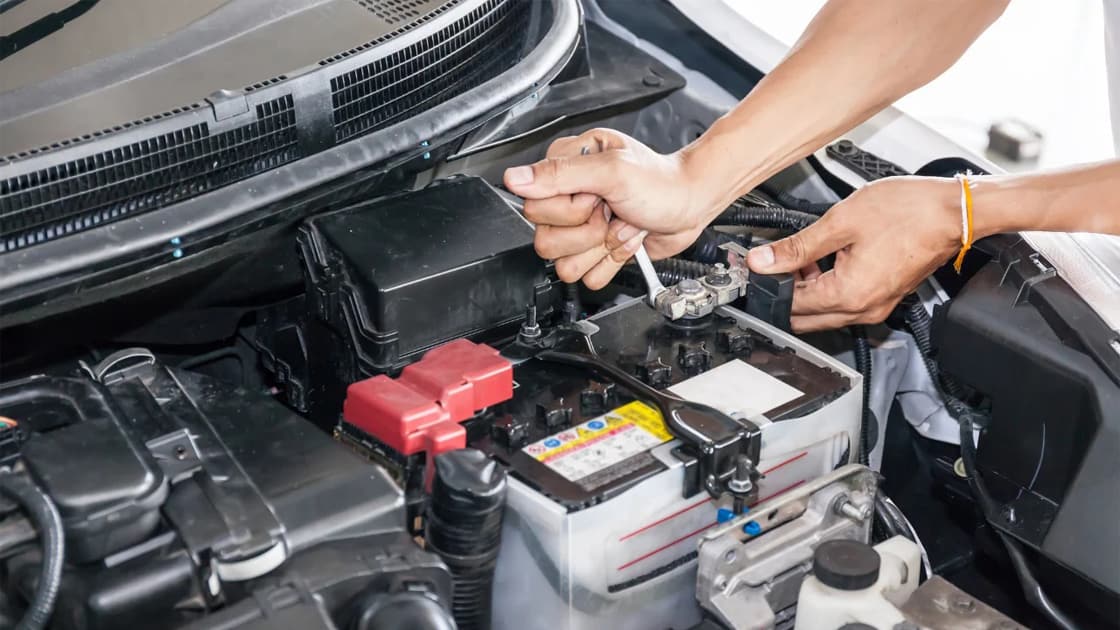Intro
As we all know, the battery plays an important role in activating and maintaining a car’s operation. It helps to actuate the engine, powering the parts to work smoothly and efficiently. However, any part or device has a shelf life, and you need to replace it periodically or when there are signs of damage.
How long do car batteries last? Not all people know the answer as well as when they should purchase a new one. That’s what we’ll show you in this post. If you’re ready, let’s get started!
How Long Do Car Batteries Last?
You may often hear people say that the average life of a car battery is 3 to 4 years. This is relatively true but not for all batteries and all situations.
The battery’s life is the amount of time that the battery can be recharged and continued to be used. Depending on the chemical composition inside the battery, each type of battery will have a different lifetime:
- Lead-acid battery: The average lifetime of a lead-acid battery will be about three to five years.
- Gel and Absorbent glass mat (AGM) battery: People also call it a dry cell lead-acid battery. High-quality Gel and AGM new batteries that are well maintained can work well for seven years.
- Lithium-ion battery: Lithium-ion battery often appears in electric cars, and it has a relatively longer lifespan than others. Even if you have driven more than 200,000 miles, the capacity can still be maintained at 70% of the original.
The manufacturer usually warrants it for five to eight years. But if used correctly, you can save time on battery replacement as it lasts for ten years or more.
- Nickel metal hydride (NiMH) battery: This one is for a hybrid car with a typical battery age of up to eight years.
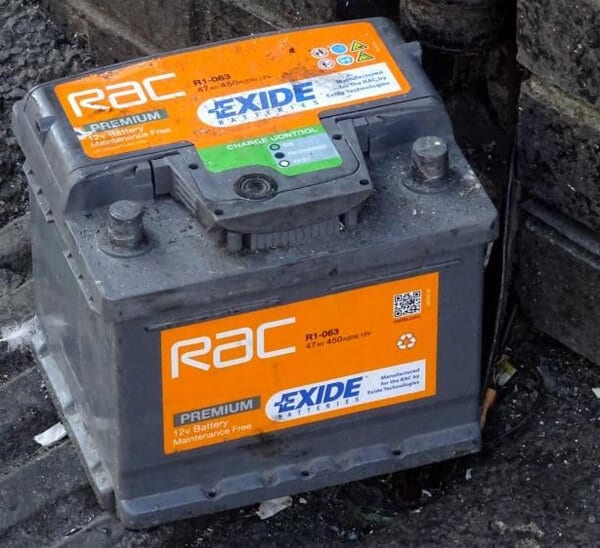
Each type of battery has a different lifespan
Related:
- How To Read Battery Charger Amp Meter? A Simple And Easy Guide
- How To Disconnect, Replace Car Battery & Install A Car Battery
- A Detailed Guide On How To Test Batteries With A Multimeter
- How To Read Car Battery Date Codes? A Simple And Detail Instruction
What Affects Car Batteries?
Using Time
Battery performance will degrade over time whether you use it or not. If you don’t use the battery and don’t recharge it, the battery may die unexpectedly.
The second scenario is that you continue to use and charge it regularly. The battery’s capacity will still decrease, and you can’t fully charge it to 100% as it was originally.
For example, a lead-acid battery has 500-1200 charge and discharge cycles before dropping to 80%. That means after charging from 500 to 1200 times, your battery will only charge up to 8% of the original. After that, the battery capacity will still decrease at the same rate.
Weather & Temperature
Weather and temperature factors significantly affect how long electric car batteries last. In terms of temperature, they both facilitate the battery’s operation and reduce its performance.
In the summer, you’ll find your car’s engine easier to start than in winter because the extreme temperatures stimulate the chemical reaction needed to generate electricity. However, the heat will evaporate the liquid in the battery, which leads to internal corrosion.
When the temperature drops in the winter or cold weather, your battery will have to struggle to activate the car engine. This reduces its quality and average lifespan which also leads to a dead battery.
Charging
We always recommend that anyone should charge the battery properly. It’s advisable to charge the batteries until they’re full and turn off the power.
Overcharging will increase the evaporation of the liquids inside and reduce the life of the battery. However, if you let the battery drain completely, recharge is difficult, and it also causes negative effects.
Suppose during the charging process you find something abnormal such as a longer charging time or a charging condition, but the battery isn’t full. In that case, we suggest you have a mechanic check to make sure that your system is still fine to continue working normally.
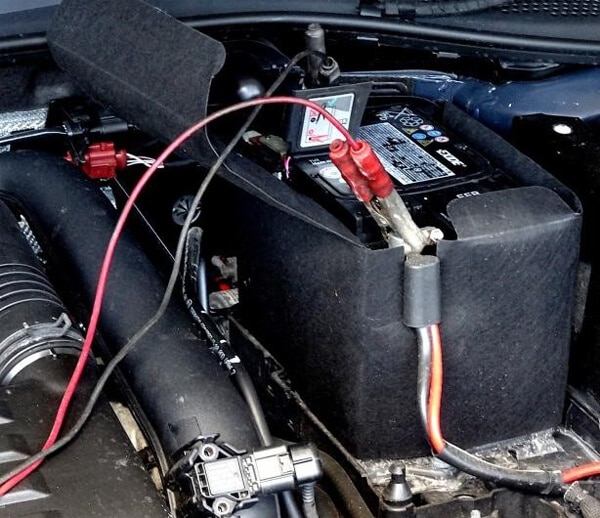
Charging affects the car battery’s life
Usage
A high-quality battery will still deteriorate quickly when not used and maintained properly with some bad driving habits or bad driving conditions. There are many ways you can extend battery life to ensure performance and save costs.
As mentioned above, even when not in use, the battery will still automatically discharge energy. The more energy-consuming devices in your car, the faster the battery will drain.
The battery will be recharged as you drive; still, driving only short trips can put a strain on your battery. It would be better to drive a few laps to charge the car instead of just traveling a short one.
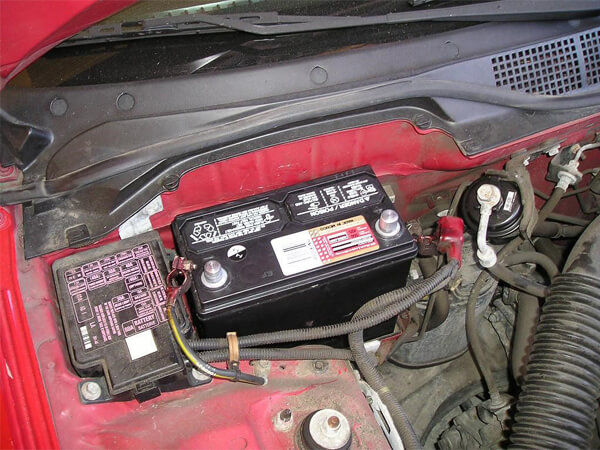
We should use and protect the car’s battery properly
Sign That You Should Replace Your Car Battery
Take a Longer Time To Start
You start the car’s engine, but it doesn’t work, and it takes longer to restart it again and again. Suppose flickering interior lights accompany this, and you hear a very long engine cranking sound; this could signify a low battery. You can bring the car to the center to check its condition or replace it if necessary.
Dim Lights And Electrical Problems
Flickering dim light or weak air conditioning could be a sign of reduced battery performance. To be more sure, there are a few simple steps to do a car battery test:
- Turn on your headlights;
- Choose a safe location and start your car (at night);
- If the lights are dim, try pressing the accelerator and checking the dashboard battery light;
- Headlights and dashboard lights light up after pressing the accelerator, indicating that your car’s battery is damaged.
Unpleasant Smell
A damaged battery can result from an internal leak. In case you open the system and feel an unpleasant odor, check the battery condition. We recommend that you replace it early to ensure safety during your trips.
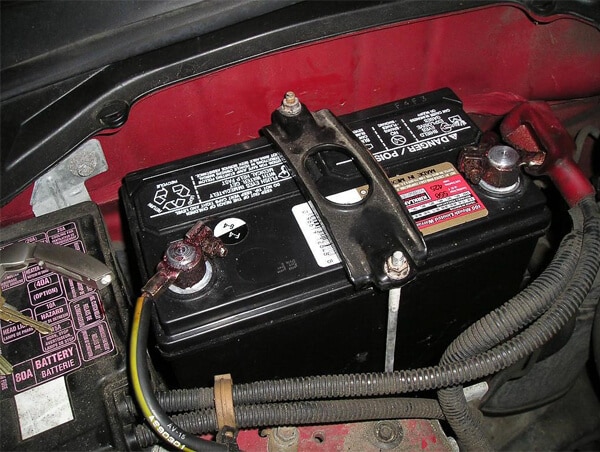
Old or damaged car batteries can cause a bad smell
Corrosion On The Battery Terminals
The battery terminals are also easily damaged by charging or external influences. Ensure you don’t leave it near corrosive substances and steam.
Misshapen Battery Case
A weak battery with a misshapen case isn’t a great choice for continued companionship. Outside temperatures can cause batteries to swell or deform, which means that you should replace them for their safety and performance.
It’s An Old Battery
And of course, there will be cases where your battery doesn’t show any signs of damage even though you’ve used it for longer than the average usage time. Should you replace it?
Based on our experience, the answer is yes. Because you may not be able to see the damage from the inside, the battery can die suddenly at any time.
Conclusion
How long do car batteries last? Until now, you’ve got the answer! It depends on many factors such as your usage, time, type of batteries, and so on.
Anyway, you should pay attention during use and ensure safety factors when using, such as periodic inspection or replacement when necessary.
The average car battery’s lifespan:
- Lead-acid battery: Three to five years
- Gel and AGM battery: About seven years
- Lithium-ion battery: About ten years or more
- NiMH battery: Up to eight years
Further Reading:
WHAT'S NEW
The best AGM battery chargers will be the ideal option to revive your flat battery without relying on professional help. These handy high-tech chargers are extremely beneficial because they offer...
The Genius Boost GB40 is popular because of its ability to help boost your vehicle when it has battery issues. Many of our customers wonder why the Noco GB40 can work greatly like so. So, we have...

